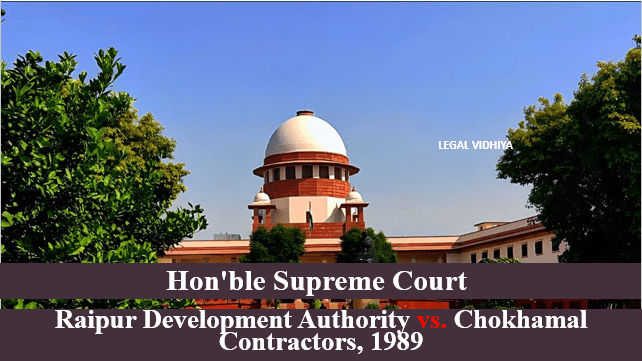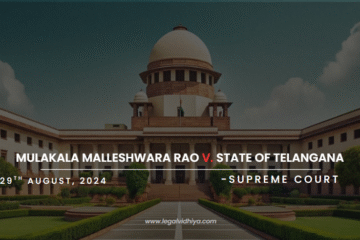
| Citation | 1990 AIR 1426, 1989 SCR (3) 144 |
| Year of Judgment | 4 May, 1989 |
| Court | Supreme Court of India |
| Plaintiff | Raipur Development Authority |
| Defendant | Chokhamal Contractors |
| Bench | Pathak, R.S. (Cj), Venkataramiah, E.S. (J), Misra Rangnath, Venkatachalliah, M.N. (J), Ojha, N.D. (J) |
| Referred | Arbitration Act, 1940: Sections 16(1)(c), 20, 21 and 30(c), 32 |
FACTS OF THE CASE
The Raipur Development Authority (RDA) and Chokhamal Contractors (CC) entered into a contractual agreement for the construction of a road, and within this contract, there was a specific provision known as an arbitration clause. This clause stipulated that any disagreements arising from the contract’s terms and conditions would be subject to arbitration for resolution.
In the course of the construction project, a contentious issue emerged between the Raipur Development Authority and Chokhamal Contractors regarding the assessment of royalty payments related to the shortfall in earth extraction. The Raipur Development Authority contended that Chokhamal Contractors bore the responsibility of paying royalties based on the entire volume of earth initially projected for extraction, even though Chokhamal Contractors had encountered unforeseen circumstances that prevented them from extracting the entire anticipated amount. Conversely, Chokhamal Contractors argued that their obligation was limited to paying royalties solely for the earth they had successfully extracted.
Given the impasse in negotiations, both parties decided to submit the dispute to arbitration. Ultimately, the arbitrator rendered a decision in favor of Chokhamal Contractors, asserting that Chokhamal Contractors liability for royalty payments was indeed confined to the actual quantity of earth extracted, as opposed to the originally estimated amount.
Dissatisfied with the arbitrator’s ruling, the Raipur Development Authority raised a challenge in the High Court, alleging that the arbitrator had conducted the arbitration proceedings improperly by failing to provide comprehensive reasons for the award. The High Court, however, upheld the arbitrator’s decision, prompting the Raipur Development Authority to escalate the matter by filing an appeal with the Supreme Court.
ISSUES
The issue raised are as follows-
- Whether it is mandatory for an arbitrator to provide justifications for their decision in an award?
- Whether an arbitrator’s omission to provide explanations in the award constitute a grave misconduct that invalidates the award?
- Whether it is permissible for the Court to scrutinize the arbitrator’s award even in cases where the arbitrator has not furnished a rationale for it?
ARGUMENTS
Arguments of the Raipur Development Authority (RDA):
- The Raipur Development Authority contends that it is incumbent upon an arbitrator to furnish a rationale for the award, as this aligns with the foundational tenet of natural justice.
- In the absence of reasons, the parties are deprived of comprehending the underlying basis for the arbitrator’s determination, thereby impairing their ability to mount challenges, should such recourse be necessary.
- Moreover, the dearth of justifications poses substantial impediments to the Court’s capacity to undertake a review of the award, when such review is warranted.
- The Raipur Development Authority asserts that the omission of reasons by the arbitrator represents a significant breach of duty amounting to serious misconduct, which consequently nullifies the award.
Arguments of Chokhamal Contractors (CC):
- Chokhamal Contractors posits that there exists no statutory mandate compelling arbitrators to expound upon their awards with reasons.
- The stipulation for the provision of reasons is not a fundamental precept of natural justice within the realm of arbitration.
- It is maintained by Chokhamal Contractors that the parties are presumed to have tacitly consented to the arbitrator’s adjudication, even in instances where reasons have not been articulated.
- Chokhamal Contractors contends that the absence of reasons does not vitiate the award, unless demonstrable misconduct on the part of the arbitrator is substantiated.
Rebuttal by the Raipur Development Authority:
- Notwithstanding the absence of a statutory directive, the practice of furnishing reasons is highly desirable, as it fortifies the principle of fairness and equity in the award-rendering process.
- The dearth of reasons indeed complicates the Court’s capacity to undertake a review, which can in turn lead to potential miscarriages of justice.
- Furthermore, the Raipur Development Authority maintains that the arbitrator’s failure to provide reasons constitutes a grave dereliction of duty, eroding the trust reposed in the arbitration process.
Rebuttal by Chokhamal Contractors:
- The necessity for reasons as a mechanism for ensuring fairness and equity in awards is unsubstantiated, as arbitrators are presumed to be seasoned professionals capable of rendering equitable decisions, even sans explanatory rationales.
- The Court retains the prerogative to scrutinize an award, even in the absence of reasons, by evaluating the evidentiary record and proceedings, thereby assessing the fairness of the arbitrator’s determination.
- Chokhamal Contractors underscores that the failure to furnish reasons does not per se vitiate the award, unless misconduct on the part of the arbitrator is conspicuously demonstrated, which, in the present case, remains unsubstantiated.
JUDGEMENT
In the case of Raipur Development Authority vs. Chokhamal Contractors (1989), the Supreme Court of India held that arbitrators are not mandated by statute to provide rationales for their awards. However, the Court recognized the desirability of arbitrators furnishing justifications for their awards, as this practice contributes to the fairness and equitability of the awards.
Furthermore, the Court acknowledged that the arbitrator had conducted a thorough examination of both parties’ arguments and had duly considered all presented evidence before rendering the decision. Consequently, the Court determined that there was no substantiated reason to suspect any misconduct on the part of the arbitrator, thereby validating the award.
The Court’s verdict was underpinned by the following rationale:
- Statutorily, there is no obligation for arbitrators to furnish reasons for their awards.
- The requirement to provide reasons does not constitute a foundational facet of natural justice within the domain of arbitration.
- A presumption is made that the parties have implicitly consented to the arbitrator’s decision, even when reasons have not been articulated.
- The absence of reasons does not, in and of itself, render the award invalid, unless clear evidence of arbitrator misconduct is presented.
The Court additionally took into account certain countervailing factors that militate against the imposition of a requirement for arbitrators to provide reasons for their awards:
- Such a requirement would engender delays and escalate the expenses associated with arbitration proceedings.
- It could incentivize parties to mount frivolous challenges to arbitration awards.
- It might undermine the independence and impartiality of arbitrators.
Criticism:
Critics of the Supreme Court’s ruling in Raipur Development Authority vs. Chokhamal Contractors have expressed reservations. They contend that the decision may be inequitable to parties involved in arbitration proceedings, as it renders it challenging for them to comprehend the rationale behind an arbitrator’s decision and to initiate challenges if necessary.
Furthermore, critics posit that the judgment is likely to result in an upsurge in challenges to arbitration awards, as parties may be more inclined to challenge awards when they lack an understanding of the arbitrator’s decision.
Notwithstanding the criticisms, it is imperative to acknowledge that the Supreme Court’s ruling in Raipur Development Authority vs. Chokhamal Contractors stands as the prevailing law in India. Consequently, parties engaged in arbitration proceedings should remain cognizant that arbitrators are not obligated to provide reasons for their awards. Nevertheless, parties retain the option to challenge arbitration awards, even when reasons have not been proffered by the arbitrator.
IMPORTANCE OF THE CASE
The case of Raipur Development Authority v. Chokhamal Contractors holds significance as it reiterates the established doctrine that arbitrators are under no statutory obligation to provide justifications for their awards. Nevertheless, the case underscores the critical role of arbitrators furnishing rationales for their awards to safeguard the integrity of fairness and equity.
Furthermore, the case carries substantial weight due to its adjudication by the Supreme Court of India, the apex judicial body in the nation. Consequently, the Supreme Court’s pronouncement in this matter possesses binding authority over all subordinate judicial forums within India.
RFERENCES
This Article is written by Anoskaa Barui of Symbiosis Law School, Pune, Intern at Legal Vidhiya.




0 Comments